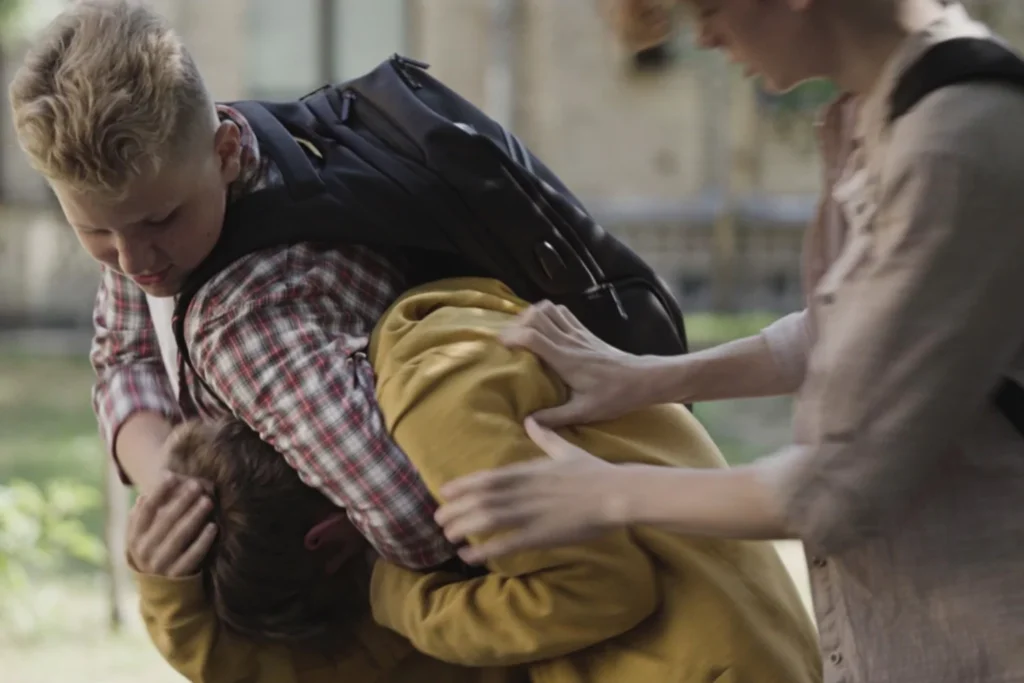
10 Things You Need To Know About Bullying and Cyberbullying
No matter what form bullying or cyberbullying takes, it happens far too often and can have damaging effects.
August 27, 2024

Many adults carry some kind of psychological hurt from their childhood years.
Estimated reading time: 5 minutes
Dealing with bullying a childhood rite of passage. Just ignore it. You’ll get over it.
Except most likely you won’t. Frank Peretti knows this firsthand. He’s one of the many walking wounded who suffered at the hands of classmates — and sometimes teachers. He believes that many adults carry psychological scars from their childhood experiences, continuing the cycle of hurt.
A recent study published in JAMA Network Open in 2023 found that nearly 20% of children in the U.S. experience bullying. According to the National Center for Educational Statistics (NCES), in the 2022-2023 school year, 16% of students in grades 9-12 reported being bullied on school property, and 11% reported being cyberbullied.
The Centers for Disease Control and Prevention (CDC) reports that 16.7% of high school students experienced bullying on school property, and 15.3% were cyberbullied in the past year.
Peretti, best known for books such as This Present Darkness, The Visitation, and The Oath, did not have a pleasant childhood. Diagnosed with cystic hygroma shortly after birth, he faced significant medical challenges. Doctors rushed him to the hospital, where they attempted to remove as much of the mass as possible. After 10 days, he returned home, “a tiny bag of bones with a long scar and black sutures that made it appear as if my head had been nearly severed and then sewn back on,” he recalls.
Peretti underwent numerous surgeries over the years, which delayed his physical development compared to other children. His physical struggles, including a scar on his neck and a swollen, black, scabby tongue, made him a target for bullying. His classmates not only ridiculed his appearance but also exploited his speech impediment.
Peretti describes his junior high school experience, especially physical education classes, as a harrowing time of torment from stronger boys. He felt trapped, with no support from teachers or coaches. “Going into the locker room meant sure torment from the stronger boys — just about everyone, that is. Being slammed up against lockers. Snapped with wet towels. Name-calling. And a coach who seemed not to notice or care.”
Peretti grew up in a Christian home, where he learned to respect authority and follow rules. He blames the school’s lack of intervention on the belief that “that’s just the way things are.” The pervasive idea that manliness is equated with cruelty made it difficult for students to speak out about their mistreatment.
The bullying extended beyond the school yard. At a neighborhood store, a classmate working there humiliated Peretti by spraying deodorant in his face. In pain and humiliation, Peretti stumbled outside, collapsed on the curb, and cried.
At home, Peretti found solace in his interest in movie monsters like Frankenstein and the Creature From the Black Lagoon. “What made monsters cool to me was they were ugly. They were rejected, misunderstood and picked on. The thing about monsters I liked was they seemed to have some kind of control over the situation. They weren’t victims. They made victims.”
One teacher made a significant difference by noticing Peretti’s distress and asking a simple question: “How are you doing?” This concern inspired Peretti to write a detailed letter to the gym teacher, describing his daily suffering. A few days later, the gym teacher and a guidance counselor arranged for Peretti to be exempted from P.E. “He was real kind,” Peretti recalls. “He smiled at me. I told him, ‘If you were a girl, I’d kiss you.’ He just smiled back and said, ‘You’re welcome.’ It just took one teacher to care.”
Peretti believes that more teachers and principals need to show such concern. Reflecting on tragic events like the school shootings, he identifies with the victims’ anger and frustration. “If you’ve got the disposition to let anger fester, and that’s what happened with [the Columbine Highschool shooters], something is going to happen.”
Peretti highlights that the wounds from bullying can last a lifetime. He cites a friend whose children were bullied at a Christian school. The friend, who had been a bully himself, still remembers the names and faces of those he mistreated and wonders if they still carry wounds from his actions.
Peretti explains that bullying often starts when a child is labeled as inferior, different, or ugly. This can lead to a self-fulfilling prophecy where the child expects to be mistreated and is more likely to be targeted. Bullying can also create a cycle where victims become bullies themselves.
Peretti divides bullies into two categories: those who bully because they have personal issues or a troubled life, and those who bully to maintain their social status. Both types can have lasting impacts on those left with dealing with bullying, of by themselves.
In Peretti’s case, bullying influenced a major life decision. After an encounter with an upperclassman who made a derogatory remark, Peretti decided not to attend Seattle Pacific University and delayed his college education until he was 25.
Whether as a bully or a victim, the effects of bullying can be profound and long-lasting. Peretti’s experiences underline the importance of empathy, intervention, and understanding in addressing bullying and its impacts.